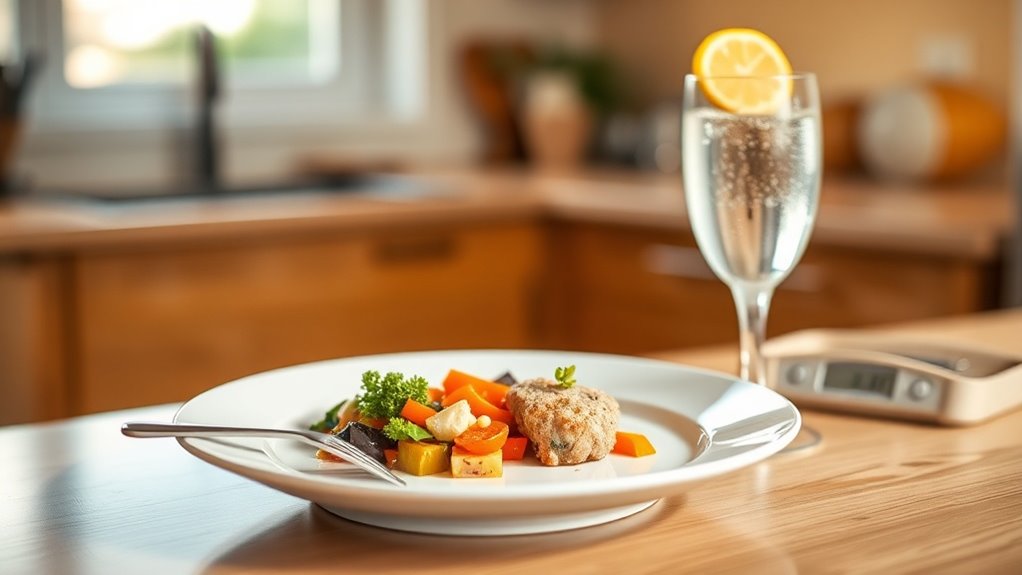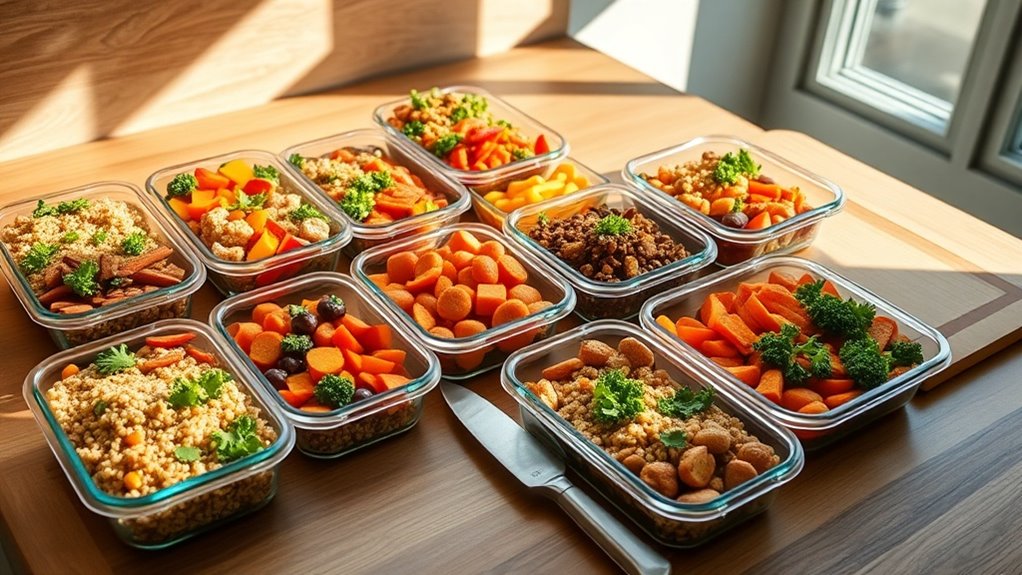5 Simple Ways to Stop Overeating and Take Back Control of Your Diet!
You’ve probably noticed how overeating can add up to 20% more calories than you realize, affecting your health subtly. That’s why these five strategies, like eating slowly and using smaller plates, offer practical solutions to reclaim control. Once you start, you’ll uncover even more ways they transform your daily habits.
Key Takeaways
- Eat slowly and mindfully to reduce calorie intake and recognize fullness faster.
- Use smaller plates to make portions appear larger and naturally cut back on eating.
- Keep a food diary to track meals and identify triggers for overeating.
- Establish regular eating schedules to stabilize hunger and prevent excess consumption.
- Drink water before meals to promote a sense of fullness and curb appetite.
Eat Slowly and Mindfully
How do you tackle overeating effectively?
One of the best overeating solutions is to eat slowly and mindfully, which research shows can reduce calorie intake by up to 10%.
You’re in control when you savor each bite, chewing thoroughly and focusing on flavors and textures without distractions.
This practice signals your brain to recognize fullness faster, preventing excess consumption.
Make it a habit by setting your phone aside and pausing between bites.
You’ll find meals more enjoyable and portions naturally align with your body’s needs, fostering long-term weight management and healthier eating patterns.
Additionally, mindful eating enhances digestion by increasing salivation and promoting the effective release of digestive enzymes.
Use Smaller Plates for Portions
Another effective strategy is to swap your standard dinnerware for smaller plates, which can trim portion sizes by up to 20% according to studies. You’ll create an optical illusion that makes food portions seem more substantial, tricking your brain into satisfaction with less.
Research from Cornell University shows this technique reduces calorie intake without hunger pangs.
Opt for plates no larger than 9 inches; serve your meals as usual, and you’ll naturally downsize portions. This evidence-based hack fosters better control, minimizing overeating risks while promoting healthier habits through simple environmental changes.
Stay consistent, and you’ll reclaim dietary balance effortlessly.
Additionally, plates with narrower rims can further enhance this illusion by drawing more focus to the food, helping manage portions even better.
Keep a Food Diary
Keeping a food diary builds on portion strategies by giving you a clear view of your eating habits.
It empowers you to spot patterns and triggers that lead to overeating, backed by studies showing increased awareness reduces intake by up to 15%.
You’ll track everything accurately for better control.
Here’s how to make it vivid and effective:
- Log every bite: Picture writing down each meal’s details, from a handful of nuts to a full plate, making portions feel tangible.
- Note emotions and settings: Imagine capturing how stress or boredom drives snacking, revealing hidden cues.
- Use visual tools: Envision an app with color-coded entries, turning abstract habits into colorful charts.
- Review regularly: See yourself flipping through pages, spotting trends like late-night munching to adjust proactively.
Additionally, keeping a food diary supports recognizing triggers to help identify emotional factors like stress and boredom that contribute to binge eating.
Establish Regular Eating Schedules
Establishing regular eating schedules stabilizes your hunger levels and cuts down on overeating triggers. Research from nutrition science indicates that consistent meal times sync your body’s circadian rhythm, minimizing insulin spikes and cravings. You’ll prevent blood sugar fluctuations by planning breakfast, lunch, dinner, and snacks at fixed hours daily. For instance, aim for meals every 4-5 hours to keep energy steady. This approach, backed by studies in the Journal of Nutrition, empowers you to control portions and reduce mindless snacking, fostering long-term dietary success without relying on quick fixes. Furthermore, by incorporating strategic meal timing, such as spacing meals properly and having the last meal earlier in the evening, you can improve digestion and prevent overeating.
Drink Water Before Meals
Drinking water before meals can effectively reduce overeating by promoting a sense of fullness.
This evidence-based strategy, supported by studies showing it curbs appetite, helps you eat mindfully and avoid excess calories.
- Visualize filling your glass: Imagine cool water sliding down, signaling your brain to prepare for eating and dampening hunger pangs.
- Picture the pre-meal ritual: See yourself pausing to drink, creating a moment of calm that sets a controlled tone for your meal.
- Envision stomach expansion: Feel the water occupying space in your belly, making portions seem more satisfying and vivid in your mind.
- Imagine lighter satisfaction: Experience walking away from the table energized, not bloated, as water aids digestion and reinforces portion control.
Additionally, staying hydrated can prevent confusion between thirst and hunger, supporting better recognition of satiety signals.




